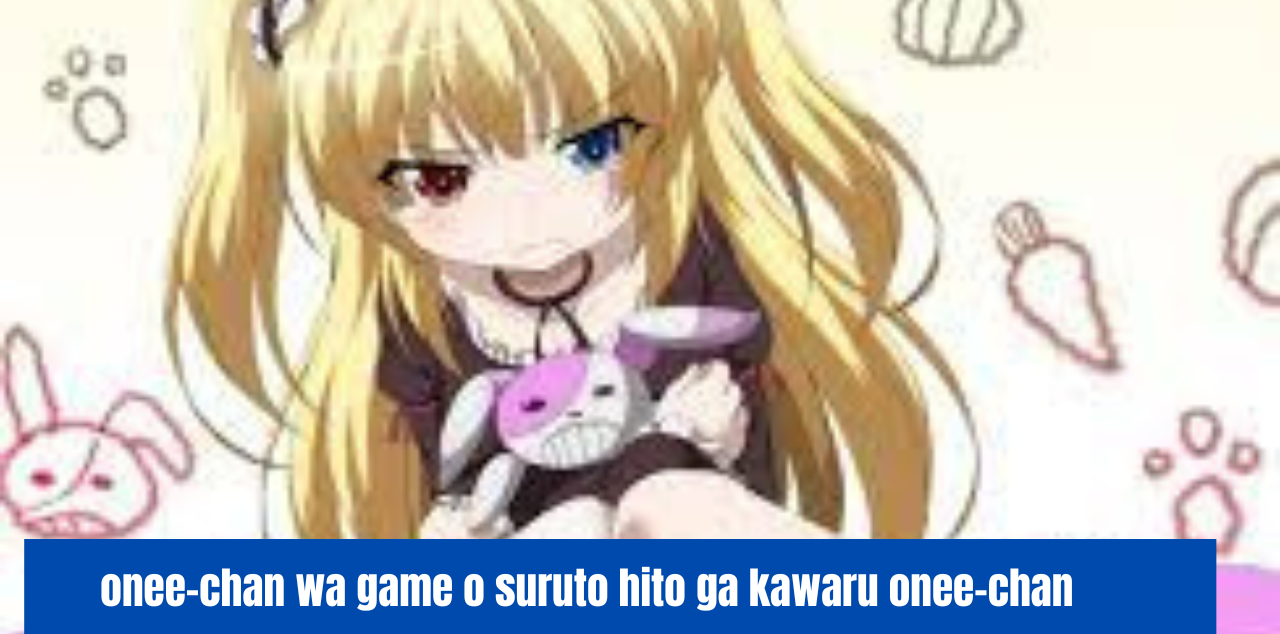My family has always been close-knit, and we all have similar hobbies and interests. But there was one thing that has always captivated me: how my elder sister changed when she played computer games. She generally has a calm, collected demeanour in our regular interactions. She transforms, though, as soon as she picks up the controller. She becomes excited, the enthusiasm or stress in her voice increasing. She might be forceful and even competitive, striving for excellence or planning her next course of action. It’s a side of her that I seldom ever observe outside of this virtual world. She may appear to be a different person to others, but I’ve come to know that it’s only another aspect of who she is. My older sister’s dual personality—calm and fiery—is what draws people to her. Onee-Chan Wa Game O Suruto Hito Ga Kawaru Onee-Chan
Before Games, “Onee-chan”‘s Evolution
An elder sister is referred to as “Onee-chan” in Japanese culture and language. Traditionally, younger siblings would refer to their older sisters as “sisters” out of respect and deference. This has given rise to a variety of representations, from the devoted and watchful older sister to more comic or even exaggerated ones. It is possible to interpret the title “Onee-chan wa game o suruto hito ga kawaru” to mean “When my big sister plays games, she changes.” It suggests a plot in which a character, most often the elder sister, has a change in personality as a result of being interested in gaming. Such a notion is ubiquitous in popular culture; characters frequently display dramatic behavioural changes when given access to a new interest, passion, or even addiction. Onee-Chan Wa Game O Suruto Hito Ga Kawaru Onee-Chan Gaming may work as the impetus in this specific story to reveal a new, unanticipated aspect of the “Onee-chan” character. This may be viewed as a mirror of how gaming has changed in the real world. Onee-Chan Wa Game O Suruto Hito Ga Kawaru Onee-Chan. Gaming, which was formerly seen as a fringe or quirky hobby, has erupted into popular culture all across the world. Character stereotypes in media have changed, much as how people view gamers. The diverse, modern lady who can blend traditional responsibilities with modern desires might be represented by the “Onee-Chan Wa Game O Suruto Hito Ga Kawaru Onee-Chan”.
The Seduction of the Online World
The virtual world frequently exerts an alluring spell on its consumers in modern culture. This temptation of online and video games for metamorphosis is captured in the idiom “When My Older Sister Plays Games, She Changes.” Many people see gaming as more than simply a hobby; it’s another reality where they may take on new identities, Onee-Chan Wa Game O Suruto Hito Ga Kawaru Onee-Chan explore new realms, and feel a wide range of emotions. The elder sister who was described may use gaming as an escape from the daily grind or as a way to express repressed emotions. Her demeanour, attitude, and even aura could change as she loses herself in the game, demonstrating the deep influence the virtual world can have. While some may find this transformation to be a welcome one, others may worry about the hazy future between the physical world and the digital world. However, the phenomena highlight the age’s strong effect on and appeal of the digital world. Onee-Chan Wa Game O Suruto Hito Ga Kawaru Onee-Chan

The First Game of Onee-chan
A small child in Japan who goes by the nickname “Onee-chan” lives in a sleepy village. Even though technology is advancing quickly all around Onee-chan, she has never experienced the video game industry. She has consistently prioritised her academic work, extracurricular interests, and time with her younger brother. Onee-Chan Wa Game O Suruto Hito Ga Kawaru Onee-Chan. But one day, a stroke of luck grants her possession of a game system. Onee-chan begins to transform in unexpected ways as she explores this new digital world. She develops greater self-confidence, and imagination, and starts to question the orderly society she lives in. This game serves as both a portal for her into a parallel realm and a mirror reflecting her actual self. Her voyage of self-discovery, the ties she forges with people around her, and the epiphany that sometimes a game is more than just a game are all captured in the narrative. Onee-Chan Wa Game O Suruto Hito Ga Kawaru Onee-Chan It can signal the start of a change.
Changes to Daily Routines
Every time my older sister immerses herself in video games, I’ve seen a dramatic change in her throughout the years. Onee-Chan Wa Game O Suruto Hito Ga Kawaru Onee-Chan. Many people find monotony and predictability in daily routines, but for my “one-chan” (a Japanese name for my older sister), picking up a gaming controller represents a little break from her routine. Her demeanour changes as she becomes absorbed. It’s not only about escaping; it’s also about embracing a world in which she has agency, faces difficulties, and encounters unexpected things. She is more than simply my sister in the world of video games; she is a contender, a strategist, and a hero. Onee-Chan Wa Game O Suruto Hito Ga Kawaru Onee-Chan Her laughter, annoyance, and enthusiasm when playing are proof of the tremendous influence games have had on her, changing her daily demeanour. Even though games are frequently criticised for Instead of being a diversion, they serve as a vehicle for my onee-chan’s development, relaxation, and change, bringing to light aspects of her personality that daily activities would obscure.

Changes in Personality: The Double-Edged Sword
“Personality Changes: The Double-Edged Sword” investigates the interesting idea of how a person’s personality and traits might change as a result of their involvement with video games. The Japanese proverb “onee-chan wa game o suruto hito ga kawaru,” which means “when my older sister plays games, she becomes a different person,” makes this idea quite clear. On the one hand, the phenomena underlines how adaptable human behaviour is as well as the significant influence of interactive media. Video games may provide doors for people to discover new aspects of who they are while encouraging creativity, strategic thinking, and social engagement. Onee-Chan Wa Game O Suruto Hito Ga Kawaru Onee-Chan. Onee-Chan Wa Game O Suruto Hito Ga Kawaru Onee-Chan However, there is a warning story concerning the possible dangers. Overcoming may result in personality changes and alterations that could be harmful, leading to a withdrawal from obligations in real life and troubled relationships. To guarantee that the changes are beneficial to one’s well-being rather than harmful, it is crucial to achieve a balance even if video games provide a dynamic platform for personal growth.
Personal Life
My older sister, known as “one-chan” in Japanese culture, is well known in our family for her cool and collected demeanour. She has always been a tower of strength for the family because of her elegance and stoic demeanour. Onee-Chan Wa Game O Suruto Hito Ga Kawaru Onee-Chan. However, there is one intriguing circumstance that stands out as a sharp contrast to her typical behaviour: every time she explores the realm of video games. Playing video games reveals her competitive side as well as a passion and energy that are uncommon in her regular existence. It almost seems like she transforms, letting go of her typical characteristics and embracing a livelier, more vibrant version of herself. She may escape the everyday with these gaming sessions and lose herself in virtual adventures, wars, and also stories. I’ve learned through observing this unexpected side of onee-chan that everyone has a way of genuinely expressing themselves, Onee-Chan Wa Game O Suruto Hito Ga Kawaru Onee-Chan regardless of how quiet or dignified they may be. In the case of Onee-chan, it’s the virtual world of video games.

The Effects of Gaming on the Mind
The psychological effects of gaming have long been a source of discussion. Many of us have seen firsthand the transformational power of gaming on people within the context of our own lives, much like the phenomena I saw with my elder sister. Her attitude and behaviour clearly change whenever she enters the virtual world. It seems as though the boundaries of the screen enable her to take on a new character, discarding her daily inhibitions and embracing a less restrained, perhaps even more assertive, version of herself. This shift need not be harmful. Onee-Chan Wa Game O Suruto Hito Ga Kawaru Onee-Chan. In truth, playing video games can be therapeutic, a way to push oneself, discover new worlds, and even develop useful skills. My sister’s changing connection with gaming has provided a glimpse into the wide-ranging psychological effects of this well-liked activity. The impact of gaming on the mind is without a doubt substantial, whether it serves as a tool for personal development, a coping mechanism,Onee-Chan Wa Game O Suruto Hito Ga Kawaru Onee-Chan or a dangerous trap.
Keeping the real and virtual worlds in check
The line separating the virtual and physical worlds is frequently blurred in the age of fast technology growth. The way my sister changes when she spends a lot of time playing video games is the ideal instance of this phenomenon. Her behaviour, vocabulary, and even her reactions start to change as she immerses herself further in these virtual worlds as if she were taking on a new character. The forceful, self-assured lady I know in real life transforms into a cunning, violent fighter in video games. Her flexibility and suppleness are impressive, but they also raise concerns about how the virtual world affects one’s real-life identity. Is she just getting used to the surroundings of the game, or is she finding a secret aspect? It’s essential that these two worlds coexist in harmony. People need to be able to tell when to detach and re-ground themselves in reality. The actual world, full of palpable emotions, connections, and experiences, remains our anchor while the virtual world provides a means of exploration and escape. Onee-Chan Wa Game O Suruto Hito Ga Kawaru Onee-Chan

Onee-Chan Wa game O Suruto Hito ga Kawaru Onee-Chan
My older sister changes into a different person when she plays video games. She often exudes quiet restraint and assumes a composed demeanour when facing the world. But as soon as she takes up a controller, it’s like she transforms into someone else. When she feels passionate, her eyes light up, and she reacts quickly, precisely, and occasionally rather loudly. It’s almost like seeing an accomplished athlete respond with unequalled passion while totally concentrating on the game. This transformation is both unexpected and interesting, Onee-Chan Wa Game O Suruto Hito Ga Kawaru Onee-Chan and it provides a rare glimpse into a part of her that few people get to witness. It only goes to show that everyone has interests and passions that may bring out various aspects of their personalities.
CONCLUSION
“Onee-chan wa game o suruto hito ga kawaru” is Japanese for “when the elder sister plays a game, she changes.” This demonstrates the profound effect that gaming has on people and their personalities. For some people, gaming may be an escape, an opportunity to take on a different persona, or a place where they can engage in experiences that are not possible in the real world. In the case of the older sister, it can imply that she changes when playing a game, possibly becoming more engrossed or competitive or perhaps showing a part of herself that isn’t usually displayed. It’s possible for these changes to be both good and bad. Onee-Chan Wa Game O Suruto Hito Ga Kawaru Onee-Chan. Positively, playing video games with people may develop social bonds while also improving cognitive capacities, Onee-Chan Wa Game O Suruto Hito Ga Kawaru Onee-Chan problem-solving capabilities, and other talents. On the downside, excessive gaming causes dependency or social isolation. The discovery ultimately highlights the enormous impact of gaming on people, revealing facets of their personalities that could otherwise go unnoticed in normal situations.
FAQ: Onee-Chan Wa game O Suruto Hito ga Kawaru Onee-Chan
‘Onee-chan’: Who is she?
In Japanese culture, an older sister is frequently referred to as “one-chan.”
Why does gaming have such a big impact on people?
A person’s emotions and behaviour can be greatly influenced by compelling tales, difficulties, and a sense of success.
Do extended video games pose any health risks?
As with everything else, playing video games too much can cause health problems like eye strain and schedule disruptions. Balance is important.
Can video games really provide job opportunities?
Absolutely! There are several options, from professional gaming to broadcasting and game production.
‘Onee-chan’s’ status as a gamer in society is it evolving?
While opinions differ, acceptance and respect have increased along with the popularity of gaming.





